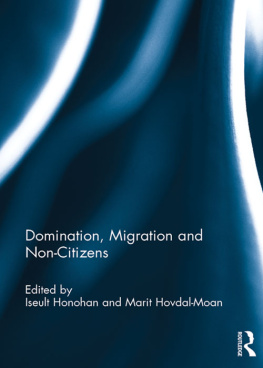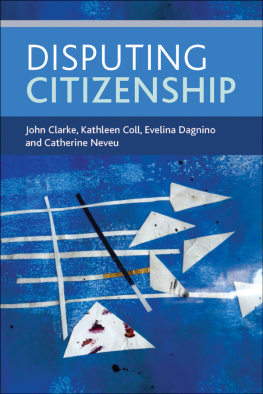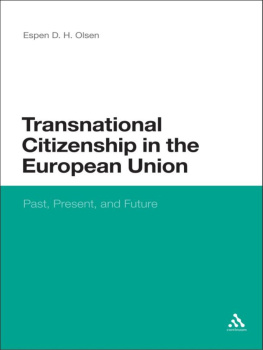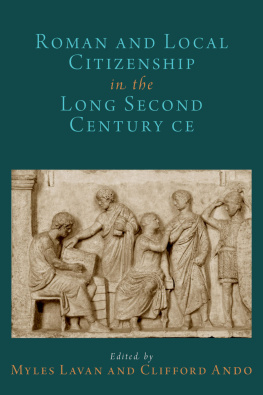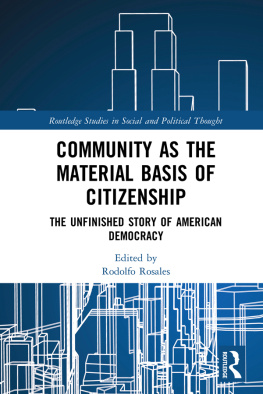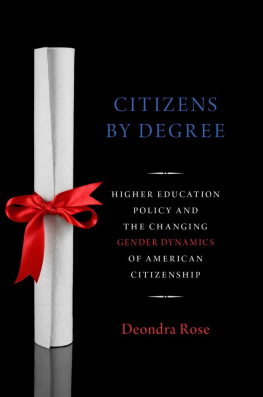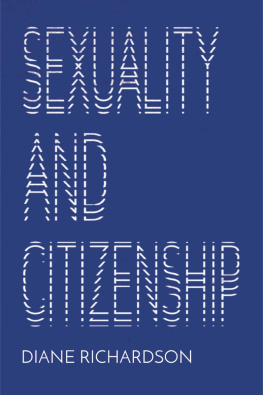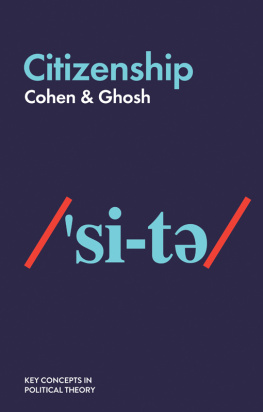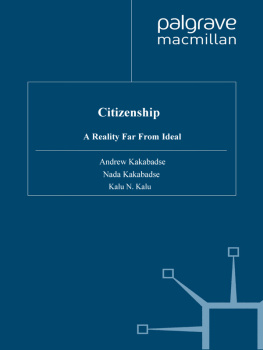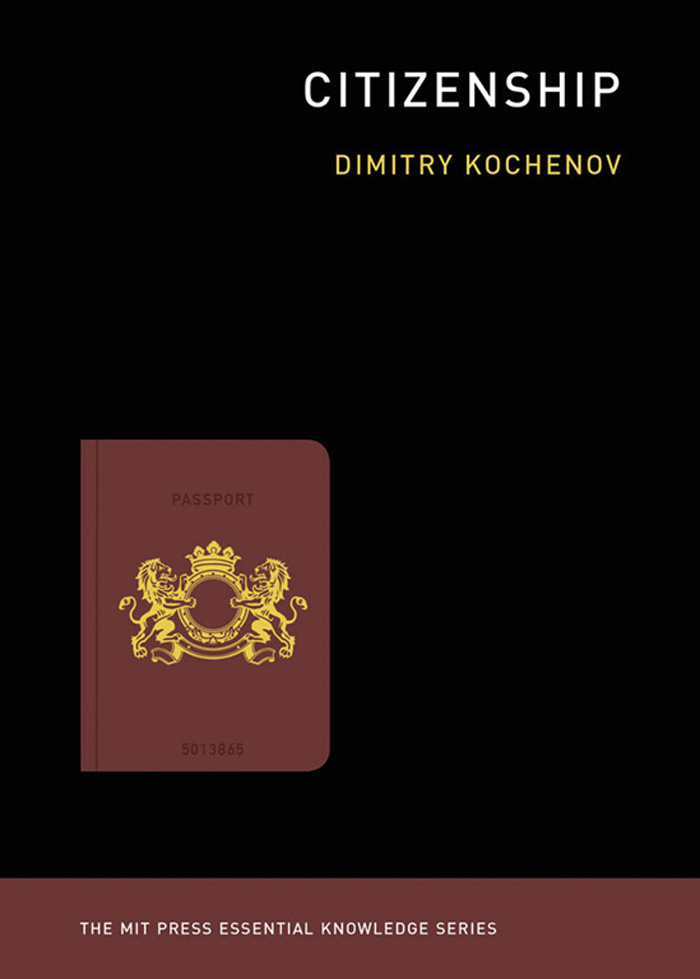
Citizenship
The MIT Press Essential Knowledge Series
A complete list of the titles in this series appears at the back of this book.
Citizenship
Dimitry Kochenov
The MIT Press | Cambridge, Massachusetts | London, England
2019 Massachusetts Institute of Technology
All rights reserved. No part of this book may be reproduced in any form by any electronic or mechanical means (including photocopying, recording, or information storage and retrieval) without permission in writing from the publisher.
This book was set in Chaparral Pro by Toppan Best-set Premedia Limited. Printed and bound in the United States of America.
Library of Congress Cataloging-in-Publication Data
Names: Kochenov, Dimitry, 1979- author.
Title: Citizenship / Dimitry Kochenov.
Description: Cambridge, MA : The MIT Press, [2019] | Series: The MIT Press
Essential Knowledge series | Includes bibliographical references and index.
Identifiers: LCCN 2019005626 | ISBN 9780262537797 (paperback : alk.
paper)
Subjects: LCSH: Citizenship.
Classification: LCC JF801.K64 2019 | DDC 323.6dc23 LC record available at https://lccn.loc.gov/2019005626
10 9 8 7 6 5 4 3 2 1
E pluribus unum is an alchemists promise; out of liberal pluralism no oneness can come.
Michael Walzer
d_r0
Contents
Series Foreword
The MIT Press Essential Knowledge series offers accessible, concise, beautifully produced pocket-size books on topics of current interest. Written by leading thinkers, the books in this series deliver expert overviews of subjects that range from the cultural and the historical to the scientific and the technical.
In todays era of instant information gratification, we have ready access to opinions, rationalizations, and superficial descriptions. Much harder to come by is the foundational knowledge that informs a principled understanding of the world. Essential Knowledge books fill that need. Synthesizing specialized subject matter for nonspecialists and engaging critical topics through fundamentals, each of these compact volumes offers readers a point of access to complex ideas.
Bruce Tidor
Professor of Biological Engineering and Computer Science
Massachusetts Institute of Technology
Preface
Few concepts are as seemingly self-evident and at the same time as deeply misunderstood as citizenship. Citizenship is ancient, yet it is as appealing today as it was in the days of Aristotle: political participation, emancipation, and belonging to a communityall good things and comfortably familiar, like well-thumbed paperbacks. Flags, elections, passports, and glorious histories aside, citizenship seems almost boringwhat could there be left to write a book about? A great deal, it will turn out, as much remains concealed behind the self-evident and self-explanatory: as much as citizenship is an instrument of political empowerment and positive identity building, it is a calculated tool to tame populations, local and foreign, into complacency and to uphold the status quo of local and global injustice. When examined closely, citizenship reveals itself as a historically violent and ultimately totalitarian status of premodern nature, both rigid to an extreme and capriciously random in how it is assigned, leaving no room for choice or merit, glorying in its sexism and racism. Having been so essential to citizenship through its history, these characteristics have only recently started to fade with overwhelming reluctance over the last few decades, leaving much of citizenship devoid of meaning. As a vestige of the world predating the ideals of equality, justice, and merit, which move us today, citizenship finds itself in a truly difficult place; and once you scratch the surface of the notion, the official narrative of political emancipation rarely conceals its flaws.
However incongruous to the modern world, citizenship is very well integrated into it. It plays a fully internalized, crucial role in the life of modern democracies, and is embellished with dignity and reason when it is taught. The most fascinating feature of citizenship is this deep contradiction between its essence and its purpose on the one hand, and its reputation on the other. The story of citizenship is as much a story of flattering the pride of those who are proclaimed to belonga tale of liberation, dignity, and nationhoodas it is one of complacency, hypocrisy, and blunt domination, all dressed up as agency and the pursuit of the common good. Its an efficient way to split societies down the middle, leaving scars and divisions that are very difficult to heal. Citizenship is known to be a good thing, and a bad citizen is less deserving of compassion, understanding, or a voice. Indeed, those proclaimed bad citizens end up ignored or exiled and deprived of their status. Citizenship is a powerful instrument to reinforce popular prejudices and create new ones.
Nonetheless, at the core of modern citizenship lies a most commendable ideal of equality and dignity that can be traced back to St. Paul: the abstract concept is an idealistic proclamation, masking the actual differences between people and their passions, abilities, and aspirations. Citizenship is first of all a tool for simplifying the world. After its astonishing effectiveness in rendering people governable, what has made citizenship so popular and underpins its global reach must undoubtedly be the role it plays as the uniform shorthand for simplifying the overwhelming diversity and complexity of human societies. This is indeed a glorious proliferation. From the minuscule proportion of the population of Aristotles Athens to the absolute majority of the seven billion of the Earths population today, citizenship has spread. A multitude of factors explain this, from the gradual rise of individualism and the global proliferation of nationhood and statehoodessentially dependent precisely on citizenshipto the attractive ideas of dignity, equality, and human worth applied to strictly separated groups of individuals around the world, hundreds of times over. These ideals disappear, unfortunately, once two or more societies are considered, as opposed to only one. Proclaimed a servant of the great ideals, citizenship is a very effective abstract legal tool to justify essentially random violence, humiliation, and exclusion.
Citizenship is first of all a tool for simplifying the world.
This book is about what citizenship is, what it entails, how it came about, and how its role in the world has been changing. Crucially, it is not an account aiming to glorify the concept no matter what: what follows is a critical introduction to the idea, one that penetrates deeper than citizenships most popular clichs, which rarely delve beyond presenting it as an indispensable element of political activity, with the political rights of citizens as its defining characteristic. As this book will demonstrate, walking down this well-worn path would miss citizenships core features, which would be a pity in a work this concise. Accounts of the glories and dignity of citizenship are everywhere, yet it is the arbitrariness, violence, and servility attending citizenshipcoupled with its war on individuality and its sanctification in the fight for the preservation of the status quo, no matter which society and time we are talking aboutthat we must focus on when we interrogate it. Add to this citizenships inherent racism, its deep and chronic exclusion of women, and its upholding and reinforcing of class divisions between the haves and have-nots, and it becomes clear why citizenship is at a crossroads today: the ideals it emerged to defend have little to do with all that drives the thinking behind a good society in the contemporary world. As a result, citizenship is changing at an increasing pace and we will trace the most significant among the vectors of this ongoing change. Citizenships relevance in a contemporary world that purports leaving behind a heritage glorifying servility, racism, sexism, and arbitrary exclusioncitizenships core featuresis far from clear, or at least not self-evident.
Next page

